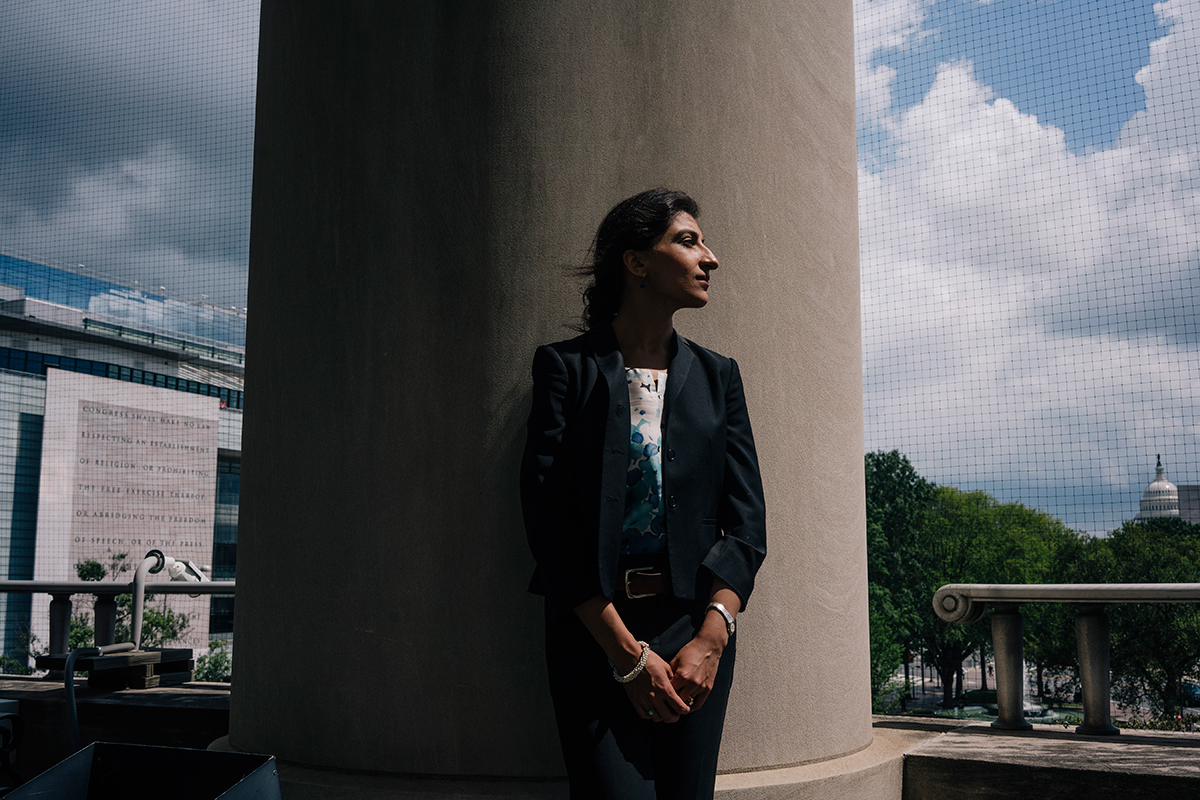For the most part, Americans have watched the advent of the massive corporation over the past half century with some degree of indifference. When companies merged with each other, they saved money on overheads, and so could provide consumers with lower prices on everyday goods. Regulators didn’t worry too much about the rise of big companies, in part since consumers weren’t complaining. But at the age of 27, while a student at Yale Law School, Lina Khan very publicly pushed back against this line of thinking. In “Amazon’s Antitrust Paradox,” a widely-read article published in 2017 in the Yale Law Journal, Khan argued that though the rise of big companies like Amazon may mean lower prices, they should not necessarily be immune from antitrust scrutiny. There is a “broader set of ills and hazards that a lack of competition breeds,” she wrote. Giant corporations can manipulate the markets they dominate, she wrote, forcing smaller companies out of business and worsening the economy for workers, citizens, and sometimes even consumers.
Khan had in roughly 24,000 words resurfaced an argument against monopolies that journalists such as Ida Tarbell had popularized more than a century ago. It’s an argument that politicians like Elizabeth Warren and Bernie Sanders are now echoing. But it was Khan’s paper and subsequent legal research that gave people in the halls of power another tool for investigating monopolies. Thinking only about whether monopolies lead to lower prices was not the right approach, she argued. “If prices are low for us as consumers but our wages are stagnant and there’s no opportunity to create our own business, that’s not self-evidently a good thing,” she says.

After her paper was published, Khan worked as a legal fellow in the office of Rohit Chopra of the Federal Trade Commission as the agency increased its scrutiny of tech firms; the FTC has recently launched probes of Facebook and Amazon. Khan, now 30, has published opeds in the New York Times calling for more scrutiny of big tech companies, and is currently on leave from her position as an academic fellow at Columbia Law School to work as counsel for the House Antitrust Subcommittee as it takes on tech companies.
Khan, whose parents immigrated to the U.S. from the U.K. when she was 11, had originally wanted to be a journalist. It was the best way to hold powerful people accountable, she thought, during journalism stints in both high school and college, including a fellowship in India. But after graduating from Williams College, she started working with the New America Foundation under the journalist Barry Lynn, and began researching how the rise of massive companies was having a big impact on Americans’ everyday life. For instance, consumers face a lack of choice in chocolate bars since two companies control the majority of the world’s cocoa processing; farmers can only buy seeds from a few giant conglomerates, which limits their bargaining power; once people start buying a specific product like Darth Vader cufflinks on Amazon, the tech company can take over the market from the small seller. The more she researched, the more she found that though consumers might have an illusion of choice, a few companies dominate large sections of the economy and set their own rules. “I think there is a very coherent story to be told about how market power is harming us as a whole in all these bizarre ways that are not readily apparent,” she says. Khan ultimately decided to go to law school so she could more effectively take on antitrust, a mission she has pursued since she became a law student. “We’re at a moment where the revival of antitrust could be extremely important in the coming decades,” she said.
- The 100 Most Influential People of 2024
- The Revolution of Yulia Navalnaya
- 6 Compliments That Land Every Time
- What's the Deal With the Bitcoin Halving?
- If You're Dating Right Now, You're Brave: Column
- The AI That Could Heal a Divided Internet
- Fallout Is a Brilliant Model for the Future of Video Game Adaptations
- Want Weekly Recs on What to Watch, Read, and More? Sign Up for Worth Your Time